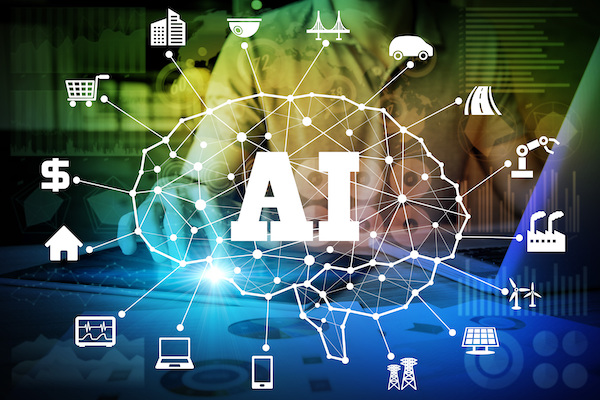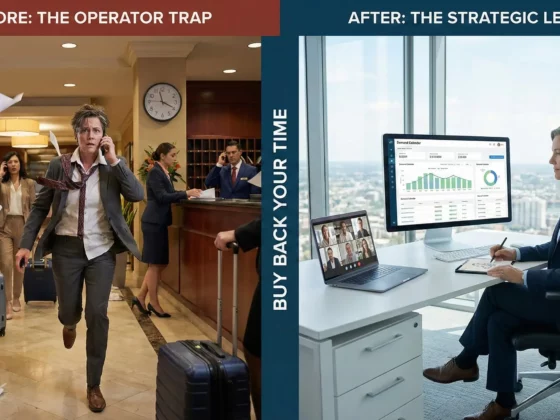
There are reasons hoteliers are or will embrace artificial intelligence: higher profits, an improved guest experience and enhanced research and booking capabilities, to name but a few. So says CBRE in a new study it’s authored titled “AI’s Impact on Hotels.”
This isn’t new, but continues to be a driving force within the hotel industry with adaption to this new, exciting and at times mysterious and even frightening technology that seems to mutate at a breakneck pace and has captured the zeitgeist of these times.
In its study, CBRE notes what is calls a “likelihood” that AI and other technology improvements “will materially shift the relationship between hotel brands, third-party management companies and hotel owners, as well as the relationship between the online travel agents (OTAs), metasearch platforms and the brands, owners and managers.”
For years, the relationship has been pretty much static: owners buy or develop hotels; they, if not running it on their own, tap a third-party management company to run it, and may elect to flag it with one of the myriad brands at the ready; meanwhile, OTAs and metasearch are monoliths within the hotel industry and AI will have a profound impact on their capabilities to drive bookings, likely at the sake of hotel owners.
The CBRE study listed eight key takeaways that are explored further below with commentary:
1: “Introducing AI-enabled machines to perform operational tasks will achieve efficiencies and realize productivity gains among knowledge workers. AI will also substantially increase leisure time available for travel. For these reasons, the number of leisure-oriented hotels will need to grow.”
Translation: AI, especially at select-service hotels that already don’t need as much staffing to run, will reduce the number of necessary jobs at hotels because there will be tasks that AI can now accomplish absent a human. The hotel industry likes to say that AI and technology “free up” staff to perform more guest-facing functions. This may be true, but the investment in AI will come with cost-savings in labor. At the same time, if CBRE’s prediction holds true that AI will allow people to travel for leisure more often, then that is a major societal shift that impacts not only travel but life and work. If it holds true, imagine more “urban/city resorts” that offer a wide array of activities and F&B options in downtown locations.
2: “AI and technological enhancements will lead to further industry consolidation and increasing benefits of scale.”
Translation: We are already seeing a shift. Consolidation is nothing new and whether or not AI drives more of it is either in the offing or remains to be seen. There has been a palpable uptick in partnerships, either between hotel brands and companies or adjacent industries. Why? Because data and loyalty programs reign supreme. Taking these touchpoints and applying AI could drive more revenue and also, as CBRE predicts, drive more monopolistic schemes.
3: “Hotel brand families are likely to grow their portfolio of strategic partnerships to improve their access to data at scale. The financial and talent resources required will leave many smaller companies at a disadvantage.”
Translation: (Author note: The translation to point 2 was written before a reading of CBRE’s third takeaway.) As CBRE further writes: “We are now beginning to see partnerships across a broader range of industries. Choice, for example, has partnered with Grubhub, which could make on-site restaurants less of a competitive advantage for some hotels. Hilton and Extended Stay America have recently unveiled partnerships with Target, Restaurants.com and DoorDash to make their points more immediately redeemable for discounts and other merchandise. It will be highly challenging for an independent hotel to compete with these types of relationships that benefit from scale and access to data.”
4: “Access to large-scale data will enable hotels to move from offering rooms for a fixed price to making pricing offers based on the total revenue potential of each guest.”
Translation: There was a time when hotels were lucky to break even on food and beverage. Now, at some hotels, F&B can be a bigger revenue generator than room sales. The same goes for wellness offerings and other ancillary opportunities. AI will be a large contributor to the evolution of revenue management and pricing decisions, allowing hoteliers to not just sell the right product at the right time for the right price but to the right person. TRevPAR is the new RevPAR, if AI has anything to say about.
5: “Some online search engines could move more directly into selling rather than advertising lodging opportunities, and the race for market share between the OTAs and the world’s largest brands is likely to continue.”
Translation: Competition is heating up. For years there was speculation that giants like Meta, Amazon and Google would get into the business of selling travel, but, up to now, that has not come to fruition. It’s curious why not given the spell these companies have over consumers and everyday life. Pitting them against the likes of established OTAs would make for some amazing competition and either be ruinous, or, at the very least, disadvantageous, for companies like Expedia and Booking.com. In its current iteration, searching for a hotel on Google presents options for booking it, from Expedia to Priceline, Booking.com to Hotels.com, who are all typically at the top of the options because they pay an inordinate amount of money to show up first; to the hotel direct, typically lower in the presentation. Imagine a world where searching for a hotel on Google allowed the user to then book it through Google’s booking engine. The ramifications would be awesome. As CBRE astutely points out: “These companies are high-margin, high cash flow and asset-light. Between them, they read your email, know where you live and when you go on vacation, what types of places you researched and chose not to go, when your anniversary is, when your kids were born, who your friends are and even what you ate last night. AI will enhance their ability to make targeted offers that suggest the right place at the right time and at the right price.”
6: “We expect the hotel brands to command higher franchise fees and the OTAs to push for higher commissions in the future. The same is true of third-party managers, where consolidation is likely to continue, and the benefits of scale will remain a key component of the value proposition for hotel owners in manager selection.”
Translation: In the end, it’s owners holding the bag. Further consolidation means less optionality, which means higher prices likely. Larger deals, like Choice Hotels’ failed bid to acquire Wyndham Hotels & Resorts, are put under immense scrutiny, but it’s the smaller deals that skate through unimpeded. However, they add up, and over time, as there are fewer brands, fewer managers, costs for owners will go up. Perhaps, to combat this, there will be a counteraction of consolidation among hotel owners. We’ve already seen this in KSL Capital’s $1.4-billion acquisition of Hersha Hospitality Trust last year. The potential parry by the ownership community top stave off higher pricing could commence at a more rapid pace.
7: “The divide between properties with many amenities and those with very few is likely to deepen. Properties in the middle—those with small wellness facilities or limited paid food and beverage—are more likely to continue scaling back amenities.”
Translation: There will be a large division between spartan hotels and bounteous ones. It makes sense: Hotels that can’t compete on facilities should scale back and offer a more fiscal package. It’s partly why the hotel industry has seen a rather large move by the brands in the economy to midscale extended-stay space.
8: “Given today’s cost of capital and pressured Gross Operating Profits (GOPs), we expect owners to wait at least another upcycle before they consider making these investments in earnest. In the initial phases, owners will replace less expensive service labor with higher-cost technical and maintenance labor and replace operating costs with depreciation expense.”
Translation: We are still some time away from a full-on, full-scale of AI invasion. The lowering of interest rates, which some believe could happen sooner rather than later, could change or expedite these decisions. Owners are keenly aware and focused on expenses that continuously drag on margins. Until there is further clarity, spending, if any, will be on brand-mandated PIPs and other CapEx improvements that were pandemic deferred.







